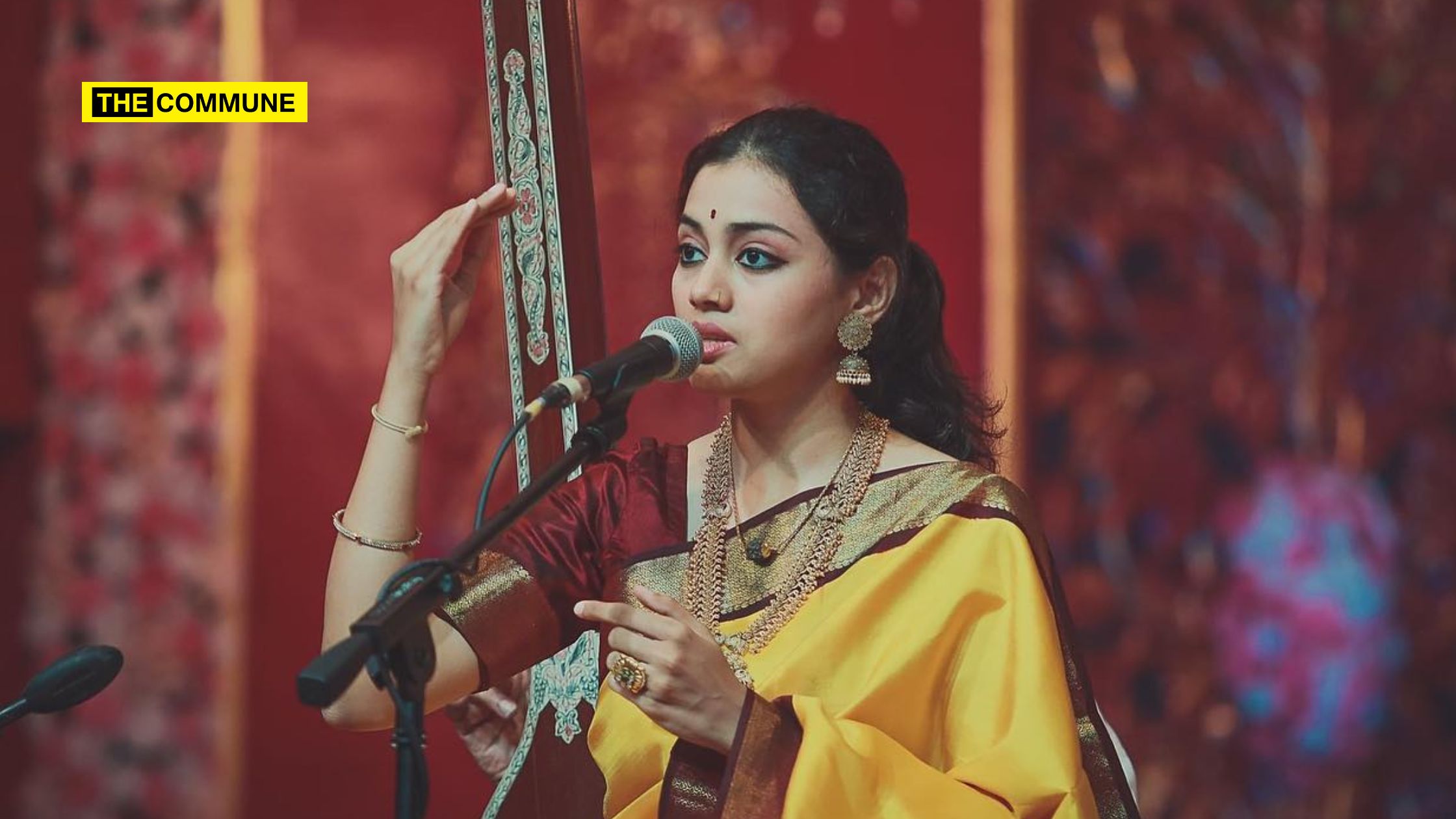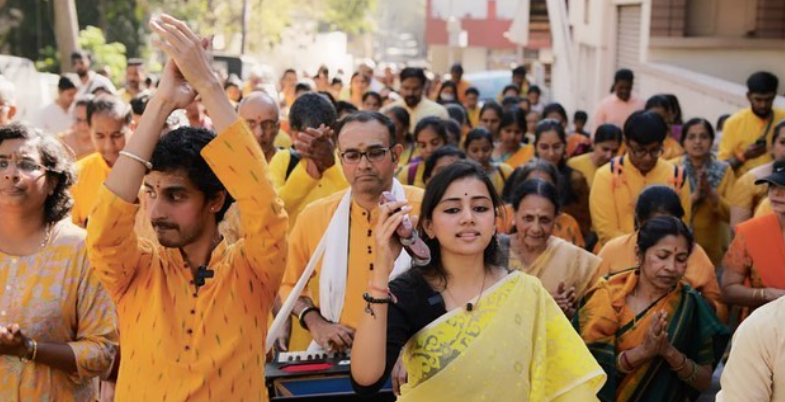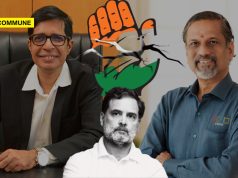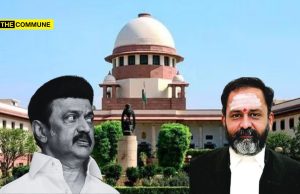
Try searching for ‘Sivasri Skandaprasad’ on Google and a Malayalam Manorama article pops up describing her as a ‘look alike’ of renowned dancer Shobana. Sivasri Skandaprasad too is a trained dancer. But she is not just that. She dons many hats as a carnatic vocalist, dancer, model, entrepreneur and an educationist.
Sivasri was born into a musical family. Her doting father Seerkazhi Sri J. Skandaprasad, who accompanies her for almost all performances and public appearances, is himself a renowned Mridangam Vidwan. She carries the heritage of her paternal lineage, being the granddaughter of the late Kalaimamani Seerkazhi R. Jayaraman, a well-established musician, and Smt. Shanthi Jayaraman, a renowned vocal accompanist for leading Bharatanatyam performers. On her maternal side, she is the granddaughter of the Thennangur Gnananandagiri Peetham, His Holiness Sri Namanandagiri Swamigal, a Namasankeerthanam exponent.
Sivasri holds a B.Tech degree in Bio-Engineering from SASTRA University, Thanjavur, and is currently pursuing an MA in Bharatanatyam from the University of Madras, alongside a Sanskrit degree from The Madras Sanskrit College.
But her academic pursuits get only a part of her time. She is in her element when she is performing, especially Namasankeerthanam.
The divinity within Sivasri Skandaprasad radiates through her face and reverberates through her voice. Her carnatic music recitals, are not just about churning out one rendition after another but carries with it a compelling narration that captures her audience.
She is trying to revive the age old Namasankeerthana tradition to spread Bhakti in streets. Recently, she was conferred the Ustad Bismillah Khan Award for culture by SMaRT (Samachar Manyata association for Research & Training).

Through this conversation, we get a glimpse into the mind and heart of an artist who has dedicated her life to music and bhakti. Join us as we uncover the symphony of Sivasri Skandaprasad’s journey.
The Commune: How did it all begin? (How did you end up where you are now, a brief introduction about yourself and your journey)
Sivasri Skandaprasad: I was exposed to Carnatic music and Bharatanatyam very early, thanks to my family of musicians and dancers. I was performing Bharatanatyam and giving concerts until Covid happened. The pandemic transformed me into a musician from a dancer. I learnt so much and realised how grounding the process was. My identity changed completely in just a year. That is when I realised the impact this transformation would have over a huge community of youngsters if oriented properly. Ahuti was born. I decided to make Ahuti into a transformative experience where the individuals who come aboard, mature into the best version of themselves with the help of cultural upliftment.
TC: We know you’re an artist and a budding entrepreneur. Tell us about a Sivasri whom we’re not aware of.
SS: I spend quite a significant amount of time meditating. I believe it answers a lot of my questions. I also wish to call myself an eco-warrior, intending to bring about a lot of sustainability measures at home and around me and eventually build an environment sensitive community. I love travelling to different places and learning about their culture. And crazy about all vegetarian cuisines across the globe. Food makes me so happy.
TC: How do you balance your academic pursuits with your passion for music and dance? Isn’t it hectic?
SS: I have a lot of time, still, that my Appa thinks gets wasted. In spite of my academics, arts, and organisation, I am not doing justice to the time I still have left. I’m hoping to squeeze more work from myself so that I can utilise the remaining time 🙂
TC: What genres or styles within classical music do you enjoy performing the most, and why?
SS: I enjoy all genres of classical music. I would say I enjoy the Bhava across all genres. I enjoy Bhakti the most, with all other bhavas following after. Bhakti is all about surrender and I find solace in that complete surrender to God.
TC: You once posted a video of yourself in free hair, singing Arunagirinathar’s Tiruppugazh. While many appreciated your singing, a few were focused on your hair. Time and again, whenever you post a photo of yourself in modern attire, many come to your comments and tell you how you should dress up. How do you find this moral policing? How do you strike a balance between tradition and keeping up with the Gen-Z trend?
SS: Many a times tradition is confused with appearance. If there is someone clad in a saree, hair braided and decorated with flowers, with a bindi that is considered legit enough by a certain group of pseudo-orthodox people, wearing basic jewellery (at least) and walks around with the clinking of anklets, they are considered traditional and only they are capable of Bhakti. Nobody cares if they actually host the core values of a true Hindu. This is the incorrect understanding of tradition, by multiple generations of egoistic and ignorant pseudo-conservatives, who are the sole reason for mass production of today’s wokes and liberals. One doesn’t stop being a bhakta or a true Hindu because of their outward appearance. How we dress, how we make ourselves presentable, has been evolving with time, and the best way is to keep up with the times. Fashion is changing everyday. And there is something great in making it our own, while we are still the same hard core Bharatiya, within.
TC: There is always this criticism that carnatic music is an area by the Brahmins for the Brahmins. Your thoughts?
SS: Music doesn’t know the Sādhaka, It knows only the sādhana. Music belongs to all, irrespective of the genre. Carnatic music is an acquired talent for the Brahmin community. According to history, South Indian classical music was learnt and performed by PāNars, isai vellaLars and devadasis in temples, as an offering to the deity. They were and still continue to be natural musicians. There is a tendency to associate anything with a structure and grammar with Brahmins (Carnatic) and anything free flowing, with the rest (Folk), which is erroneous. If one can learn with sincerity, put in the hours of Sadhana the art demands, and excel in the same, then music is theirs.
TC: Do you think today’s youngsters lack spiritual quotient and are drifting away from Indian traditions and culture?
SS: Yes, a considerable section of the youth lack spiritual quotient. In fact it is a serious concern today, that Indian art (Bharatiya Kala) and divinity are being viewed as two mutually exclusive concepts. This needs to be nipped in the bud and the divinity of this land’s tradition and culture must be restored.
TC: Tell us about Ahuti
SS: Ahuti is an organisation, conceived primarily for nation building. It is to develop the youth of Bharat into highly disciplined, self-reliant, and culturally strong individuals. We aim to transform the young of this country during this Amritkaal. Making Bharat the modern Vishwaguru, is possible only through its culture and spirituality. Hence, besides education, scientific innovations, economy, sports and politics, it is the cultural and spiritual youth of the nation, that hold the invisible reigns of this Dharm rath. Ahuti aims to achieve this in Godspeed as it is the need of the hour.
TC: You’ve many fans. But whose fan are you? Are there any artists, both classical and contemporary, who inspire your work? Who do you look up to?
SS: Every artiste is unique. I learn and take inspiration from everyone around. As my Guru once said, we should absorb the good thoughts, intentions and actions even if it is from a toddler and reject negativity even if it is from the elders. So yeah. I’m a fan of anyone whose intentions are good.
TC: Who is your biggest critic?
SS: I am my biggest critic. Mostly ruthless, as I know my strengths and weaknesses better than anyone else. I, consistently try to be a better version of myself, so that I don’t look back and regret my actions or inactions.
TC: Recently you had posted a birthday wish for PM Modi exalting him. Is Sivasri political? Is there an aspiring Parliamentarian inside Sivasri?
I admire my PM Modiji for his relentless service towards Bharat. He is setting an example to the young of Bharat. By wishing him for his birthday, I just prayed to God, to bless this Tapasvi of a leader with a long life. Every eligible citizen of Bharat elects their leader, and I’m one of them. So in a way everyone is political. Apart from this, I have nothing to do with active politics. I am a performing artist and an educationist.
Subscribe to our channels on Telegram and WhatsApp and get the best stories of the day delivered to you personally.




